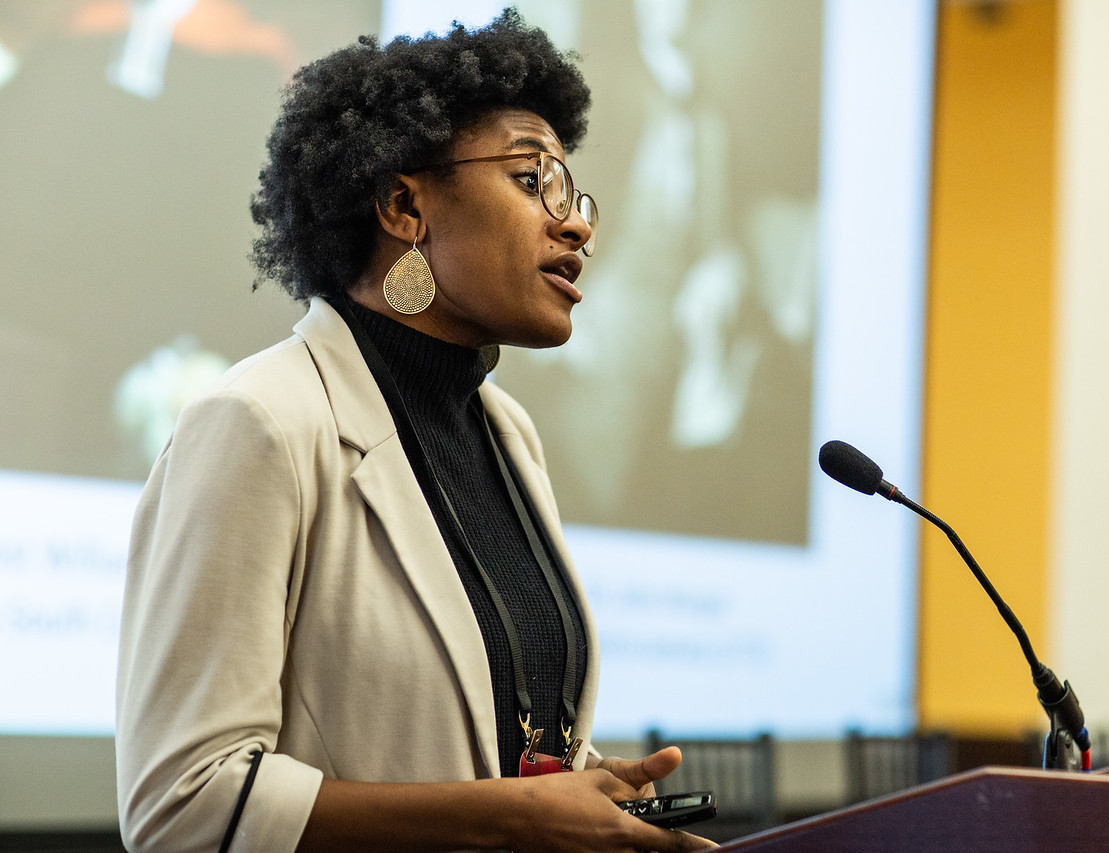A Historian’s Take on Juneteenth
In a Q&A, fifth-year Ph.D. candidate VanJessica Gladney talks about what the day means and what broader conversation she hopes it will foster.
VanJessica Gladney, a fifth-year Ph.D. candidate in the Department of History, wants to understand the concept of resistance. For her dissertation, she’s studying it in the context of Shays’ Rebellion, a series of violent uprisings by those who opposed taxes and other economic hardships in Massachusetts in 1786.
Specifically, she’s focused on the women involved, both those who supported the rebellion and those on the government side. “How did ordinary people imagine a government and shape a government right after the Revolution?” she says. “I hope to show that women were just as involved in that conversation as men.”
Through the Penn & Slavery Project, which centers on uncovering the connections between the University of Pennsylvania and the institution of slavery, Gladney’s also been trying to share the voices and perspectives of people who had been enslaved. The project started in 2017, during Gladney’s senior year at Penn.
Today, she’s the Penn & Slavery Project digital historian. She’s also collaborating with those colleagues to turn the six-stop virtual reality tour they created into a tour that can be taken in real life. “We want people to be able to hear about the formation of the project in person and get boots on the ground when we think about where the history is,” she says.
As a historian, Gladney aims to foster greater public dialogue on past events and moments like these, including Juneteenth, which President Biden formally made a federal holiday in 2021. Two years after that acknowledgement, Omnia spoke with Gladney about what the day means and what conversation she hopes it will foster.
In your own words, how would you describe Juneteenth?
Juneteenth is a celebration of the day when the “last” enslaved people were informed of their freedom, well after the Emancipation Proclamation was signed and after the Civil War was over. To me it represents the end of slavery as it was defined at that time. It’s a moment to interrogate what we mean when we say freedom and independence, a moment to think about just how long Juneteenth was after the Emancipation Proclamation.
Why do you imagine Juneteenth was finally recognized as a federal holiday in the U.S. and what conversation do you think it has spurred?
There is this tendency and a kind of comfort in learning, believing, digesting these nugget-sized narratives. Holidays like Juneteenth encourage people to question the stories they’ve been told about the country and the stories the country tells about itself. That can be incredibly uncomfortable. Maybe this is just me being a historian or a Pollyanna, but I believe the best way to learn about our past and change the present is to lean into that discomfort.
Hopefully, public recognition can start those difficult conversations that maybe won’t create backlash. And there should be some sort of language we’re ready to use about the historical importance of the day. “What is Juneteenth?” should be a question that’s asked and answered all of June. We need to recognize and center the ways that slavery, abolition, and emancipation are crucial parts of this holiday.
It’s jarring to hear the words “slavery,” “abolition,” and “emancipation” in the same sentence as “holiday” when talking about Juneteenth.
That is one of the challenges as a historian, as a person of color, as a woman. It’s so challenging to define “celebration” because in all of those categories, we’re celebrating small wins, chipping away at the barriers that have prevented America from living up to its foundational ideals. It is hard to make Juneteenth a holiday. I guess you can’t call it a day of remembrance. It’s a complicated day. It’s a day of frustration and celebration and a reminder of how much we have left to do.
As Juneteenth becomes part of broader public dialogue, what do you hope results?
I hope it leads to an understanding that Black history is an important part of American history because it is American history. You cannot tell the story of the United States of America without telling all the facets. We still have so many more to uncover and unpack.
It feels weird to use the word integrate in this context, but it also feels frustrating to consider Black history as something completely unrelated and separate. It is all a part of the American story. If we can add Juneteenth to the litany of other holidays that tell the American story, if we can fold that in, it won’t become as scary. It should be a part of the conversation. Slavery was such a prevalent part of our past and it’s a prevalent part of our present.



